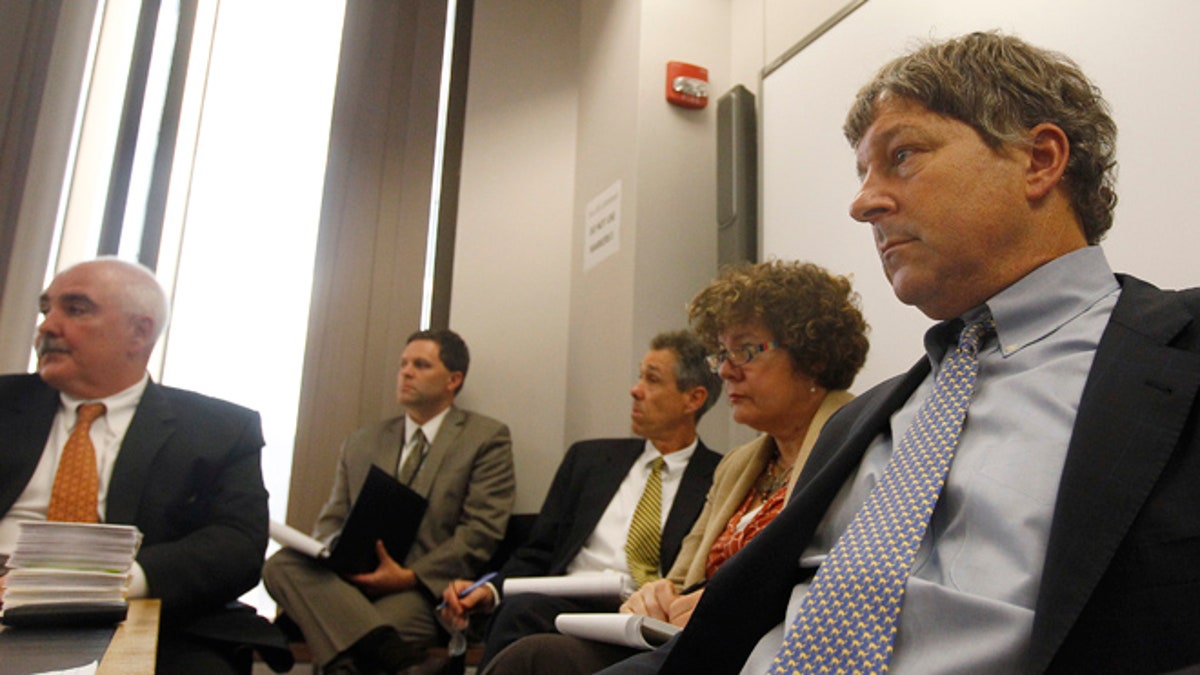
Sept. 24, 2012: David Meier, right, special consul to the Governor appointed to lead the review of drug convictions which might have been compromised by a State Police drug testing lab, leads a meeting at the Department of Public Safety in Boston. (AP)
BOSTON – The chemist at the center of a Massachusetts drug lab scandal admitted she faked test results for two to three years, forged signatures and skipped proper procedures, according to a state police report The Associated Press obtained Wednesday.
It shows Annie Dookhan told police several times that she knew she had done wrong.
"I screwed up big time," she said while becoming teary-eyed, according to the report by investigators for Attorney General Martha Coakley's office. "I messed up bad, it's my fault. I don't want the lab to get in trouble."
Dookhan's alleged mishandling of drug samples at the now-closed state lab in Boston has thrown thousands of criminal cases into question. A handful of defendants are already free or have had their criminal sentences suspended.
Authorities haven't filed charges against Dookhan or commented on her possible motives as their probe continues. The chemist hasn't responded to repeated requests for comment.
In the Aug. 28 interview with two investigators at her dining room table, Dookhan first denied doing anything wrong when she analyzed drug samples. She changed her story after they confronted her with a Boston Police Department retest of a suspected cocaine sample that came back negative after Dookhan identified it as the narcotic. Police also told her the number of samples she reported analyzing were too high and that she couldn't have done all the tests.
The report shows Dookhan then admitted to "dry labbing," or identifying drug samples by looking at them instead of testing them.
She said she tested about five out of 25 samples she got from evidence, after routinely getting a large amount of samples from different cases out of the evidence room.
She also told police she contaminated samples a few times in order to get more work finished, but that no one asked her to do anything improper.
"I intentionally turned a negative sample into a positive a few times," Dookhan said in a signed statement she gave police.
Dookhan also told investigators she routinely skirted proper procedures by looking up data for assistant district attorneys who called her directly rather than going through the evidence department.
State police say Dookhan tested more than 60,000 drug samples submitted in the cases of about 34,000 defendants during her nine years at the lab. She resigned in March amid an internal investigation by the Department of Public Health.
After state police took over the lab in July as part of a state budget directive, they said they discovered her alleged violations were much more extensive than previously believed and went beyond sloppiness into malfeasance and deliberate mishandling of drug samples.
In the August police interview, Dookhan said that in June 2011 she improperly took 90 samples that weren't assigned to her from evidence and forged another person's initials on a log book after a supervisor questioned her about it.
She admitted to forging a second colleague's initials on another report that month, saying to police later, "There was no one available -- no one has the time -- I wanted to get the work done."
Dookhan also said she falsified a May 2011 quality control report that was meant to ensure that an instrument that analyzes drugs was working.
"I got the work done, but not properly," Dookhan told police.
While Dookhan's lab duties were suspended after the incident involving the 90 samples, she said she disobeyed orders and continued to give law enforcement officials information on their cases.
Two days after her police interview, Gov. Deval Patrick ordered state police to shut down the Hinton State Laboratory.
That same day, a police lieutenant spoke with Dookhan to tell her she should get an attorney because she could face criminal charges.
Dookhan cried on the phone, saying she didn't know any lawyers, didn't have money and was in the process of a long divorce with her husband and didn't want to involve family. She also said one lawyer she talked to wouldn't take her case if she wasn't facing charges.
Dookhan told the investigator she never meant to hurt anybody and had no thoughts of harming herself.
"She said that the harm she was causing people would go through her mind every now and then," he wrote later in a report.
The police investigator again advised Dookhan to get a lawyer, gave her the number for a public defender's office and told her she should be with family.

